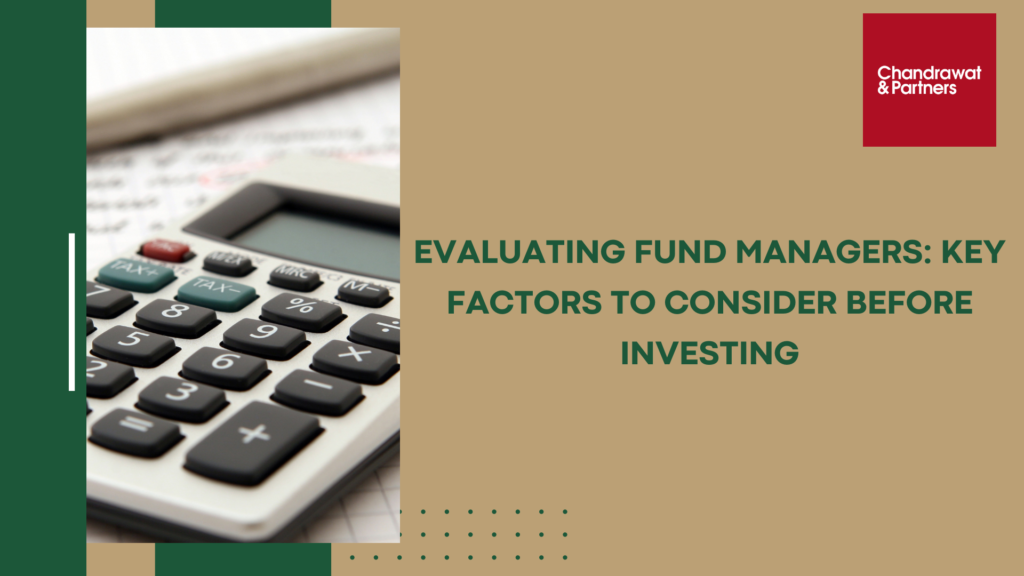Edit Content
Edit Content
Edit Content

Investing in funds may be difficult, especially when there are so many alternatives available on the market. Before entrusting fund managers with your hard-earned money, it is essential to thoroughly research on them due to the possibility of huge financial gains or losses.
The two important aspects of fund manager evaluation: track record of performance and approach to investments.
The performance history of a fund manager should be considered initially. Essential determinants of a manager’s capacity to produce profits over the long term are historical returns and consistency. Investors can learn about a company’s previous performance to see how effectively it has handled the changing market conditions and whether its methods have consistently produced gains. Investors may also determine whether a manager’s performance has been sustained or whether it was just a stroke of luck by analysing consistency.
The fund manager’s investing plan is the second element that demands consideration. Understanding their ideology and method of operation may provide us a lot information about how they handle risk and make investment decisions. Investors may assess if a company’s strategy fits with their financial objectives and risk tolerance by thoroughly comprehending it.
One of the most important aspects that needs careful consideration when it comes to assessing fund managers before making the important choice to invest; is their performance track record. Historical returns and consistency are key markers that can offer insightful information about a manager’s capacity to produce profits over time. Investors can evaluate a fund manager’s future performance potential and obtain a deeper grasp of their prior accomplishments by scrutinizing this feature.
Investors can assess the success of a fund manager’s prior investment choices by looking at historical returns. This study requires carefully examining of how the funds have been managed and have performed throughout various market situations, such as bull and bear markets and periods of economic instability. The historical returns provide a gauge of a manager’s ability in overcoming obstacles and seizing chances given by dynamically shifting market conditions.
When evaluating a fund manager’s record, consistency is also a crucial component. It alludes to their capacity to constantly provide favourable outcomes over an extended length of time. Investors look for managers that consistently produce profits despite market turbulence or economic downturns. Consistency suggests that a manager has strong investing strategies and is disciplined in putting them into practice.
A manager’s record of success not only demonstrates their abilities to potential investors but also gives them confidence. It displays their proficiency in locating high-performing assets, successfully managing risks, and modifying strategies in response to changing market conditions.
Investors should not, however, only concentrate on historically strong returns without also taking other aspects into account, such as general investing philosophies or risk management strategies.
Before putting hard-earned money into any project, it is essential to assess fund managers’ records of success. Historical returns provide information on previous profitability, whereas consistency focuses on the capacity to produce successful outcomes again over time. Investors may choose which managers are most likely to provide favourable returns in the future by doing extensive evaluations based on these indications.
The investment strategy of fund managers should be carefully considered while assessing them before investing. Understanding the manager’s philosophy and approach can provide with important insights into how they make decisions and how they invest in general. Investors may determine whether the manager’s approach fits with their financial objectives and risk tolerance by carefully examining these factors.
The manager’s approach to investing is a crucial factor to consider. This is a reference to the basic process used to choose stocks for the fund. Some managers could use a value-oriented strategy, looking for inexpensive stocks with significant long-term growth potential. Others could concentrate on growth investment, focusing on businesses that have robust growth rates and bright futures. Investors can assess the manager’s investment strategy to see if it aligns with their personal investment preferences.
It’s also critical to comprehend the manager’s investing philosophy. This encapsulates their fundamental viewpoints on markets, risk control, and portfolio management. As an illustration, some managers could adhere to a conservative attitude that places a higher value on capital preservation than aggressive returns. Others, on the other hand, can adopt a more opportunistic or contrarian mentality that looks for assets that are undervalued or unnoticed.
Investors can evaluate how the management navigates various market scenarios and manages risks by delving further into the manager’s methodology and philosophy. Additionally, it reveals if they use active or passive management techniques. While active managers aggressively purchase and sell assets in response to market circumstances to outperform benchmark indices, passive managers often monitor certain indices with little to no trading.
Investors may obtain a thorough grasp of how fund managers function in various market circumstances by taking all of these aspects into account. They can use this information to make decisions based on their risk tolerance and investing goals.
Before investing money, a crucial step in assessing investments and examining a fund manager’s strategy and philosophy. To maximize profits and reduce risks, it is essential to assess fund managers before investing. The manager’s investment strategy and performance history are two important things to consider.
The record of a fund manager’s performance offers important insights into their consistency and past results. Investors can assess a manager’s capacity to produce profitable returns and navigate diverse market circumstances by examining prior performance. Delivering returns consistently over time shows expertise and discipline and suggests that the manager has a clear investment strategy in place. It’s also critical to evaluate the manager’s performance about pertinent standards or peer groups. This comparison enables us to assess if the management has generated more wealth through their investment choices or their success.
The fund manager’s investing approach should also be carefully considered. Investors can connect their personal investing goals with the managers by comprehending the manager’s methodology and philosophy. Investors must choose a strategy that fits their risk tolerance and financial goals since different strategies have different potential risks and rewards. An investment strategy’s feasibility in various market environments may be ascertained by examining how well it has fared over time.
Investors can decide where to put their wealth by basing their selections on fund managers using these critical criteria. Investors can improve their chances of selecting knowledgeable managers who are aligned with their objectives by considering previous performance records together with an understanding of a manager’s strategy and attitude.
For more information or queries, please email us at
[email protected]

Managing Partner
Copyright © Chandrawat & Partners. All Rights Reserved.
Copyright © Chandrawat & Partners. All Rights Reserved.

Chandrawat & Partners stands as a dynamic and rapidly expanding full-service firm, specializing in the delivery of exceptional professional and corporate services to a diverse clientele, both foreign and local. We proudly represent companies and individuals across a wide spectrum of sectors through distinct entities established in various countries worldwide.
ASIA
AFRICA
EUROPE
NORTH AMERICA
SOUTH AMERICA
OCEANIA
Chandrawat & Partners uses cookies to run our site and improve its usability.
By using our site you agree to our use of Cookies.